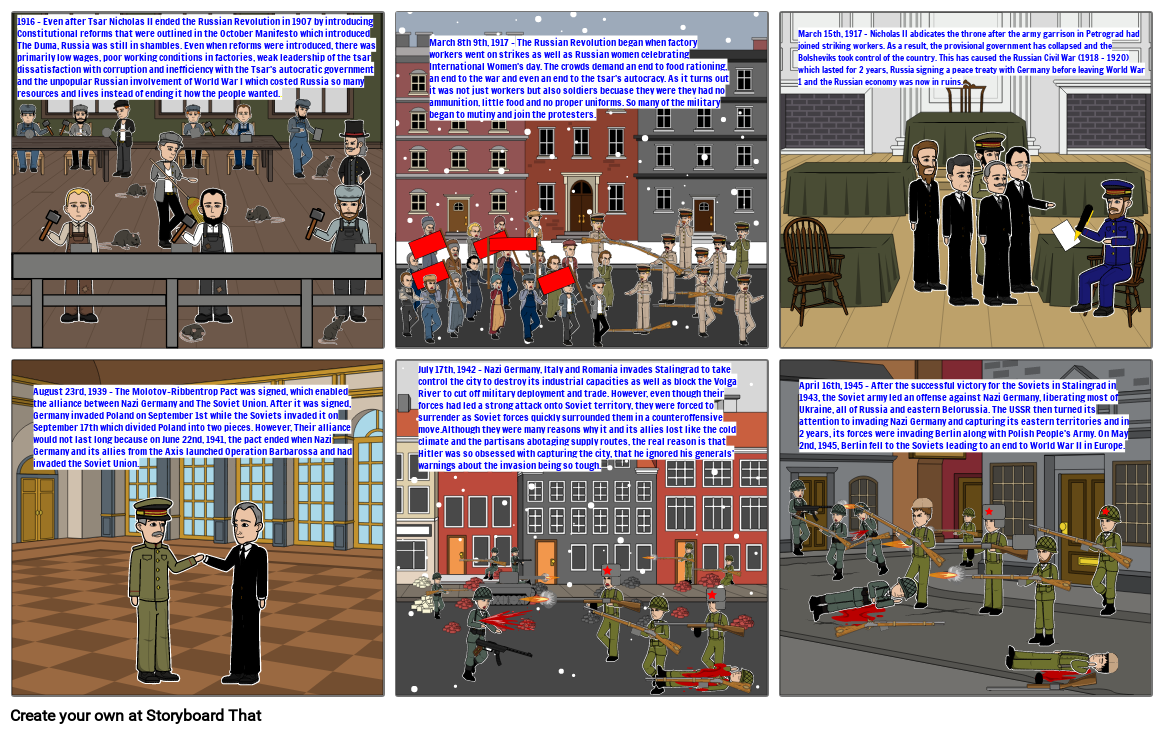The History of Russia (The Russian Revolution (1917) and World War II)

Siužetinės Linijos Tekstas
- 1916 - Even after Tsar Nicholas II ended the Russian Revolution in 1907 by introducing Constitutional reforms that were outlined in the October Manifesto which introduced The Duma, Russia was still in shambles. Even when reforms were introduced, there was primarily low wages, poor working conditions in factories, weak leadership of the tsar dissatisfaction with corruption and inefficiency with the Tsar's autocratic government and the unpopular Russian involvement of World War I which costed Russia so many resources and lives instead of ending it how the people wanted..
- March 8th 9th, 1917 - The Russian Revolution began when factory workers went on strikes as well as Russian women celebrating International Women's day. The crowds demand an end to food rationing, an end to the war and even an end to the tsar's autocracy. As it turns out it was not just workers but also soldiers becuase they were they had no ammunition, little food and no proper uniforms. So many of the military began to mutiny and join the protesters.
- March 15th, 1917 - Nicholas II abdicates the throne after the army garrison in Petrograd had joined striking workers. As a result, the provisional government has collapsed and the Bolsheviks took control of the country. This has caused the Russian Civil War (1918 - 1920) which lasted for 2 years, Russia signing a peace treaty with Germany before leaving World War 1 and the Russian economy was now in ruins.
- August 23rd, 1939 - The Molotov-Ribbentrop Pact was signed, which enabled the alliance between Nazi Germany and The Soviet Union. After it was signed, Germany invaded Poland on September 1st while the Soviets invaded it on September 17th which divided Poland into two pieces. However, Their alliance would not last long because on June 22nd, 1941, the pact ended when Nazi Germany and its allies from the Axis launched Operation Barbarossa and had invaded the Soviet Union.
- July 17th, 1942 - Nazi Germany, Italy and Romania invades Stalingrad to take control the city to destroy its industrial capacities as well as block the Volga River to cut off military deployment and trade. However, even though their forces had led a strong attack onto Soviet territory, they were forced to surrender as Soviet forces quickly surrounded them in a counteroffensive move.Although they were many reasons why it and its allies lost like the cold climate and the partisans abotaging supply routes, the real reason is that Hitler was so obsessed with capturing the city, that he ignored his generals' warnings about the invasion being so tough.
- April 16th, 1945 - After the successful victory for the Soviets in Stalingrad in 1943, the Soviet army led an offense against Nazi Germany, liberating most of Ukraine, all of Russia and eastern Belorussia. The USSR then turned its attention to invading Nazi Germany and capturing its eastern territories and in 2 years, its forces were invading Berlin along with Polish People's Army. On May 2nd, 1945, Berlin fell to the Soviets leading to an end to World War II in Europe.
Sukurta daugiau nei 30 milijonų siužetinių lentelių

